Removed_英语中代词的用法
- 格式:pdf
- 大小:170.05 KB
- 文档页数:6

单词removed是什么中文意思单词removed是什么中文意思我们只有理解了单词removed具体所指的中文意思,才能更灵活的运用removed这一英文。
以下是店铺为大家整理了单词removed 详细的中文意思,一起来看看吧!removed的中文意思英 [rɪ'mu:vd] 美 [rɪˈmuvd]原级:remove第三人称单数:removes现在分词:removing 基本解释形容词离开的; 远离…的; 与…无关的; 隔代的动词去除; 开除; 脱去(衣服等)相关例句形容词1. The aggressor troops are not many degrees removed from the brute.侵略军简直象一群野兽。
2. What you say is far removed from what you said before.你现在说的`跟你过去说的大相径庭。
removed的单语例句1. He also said Citigroup was keen to engage in brokerage business and would launch the operation once regulatory restrictions are removed.2. Robotic submarines working deep in the ocean removed a busted piece of pipe last weekend, at which point oil flowed unimpeded into the water.3. People refusing to leave those areas may have to be removed by force, he said.4. They removed smaller rubble by hand and tied ropes on big chunks of concrete, pulling them away together.5. Yao told China Daily that the boy's body was removed from the hospital this Wednesday and " should have been cremated " by now.6. Remi later said he was embarrassed by the book, and some editions have had the more objectionable content removed.7. Four of them resigned and the other one was removed after a document was issued earlier this month by the Heilongjiang Provincial People's Congress.8. A section of electricity cable has been removed from the paddock at Newbury racecourse where two horses died on Saturday after apparently being electrocuted.9. Race organizers had no idea the event would be removed from the calendar, and the official website is still advertising tickets for next year.removed的双语例句1. These aliases will be removed, as well.这些别名也将被删除。
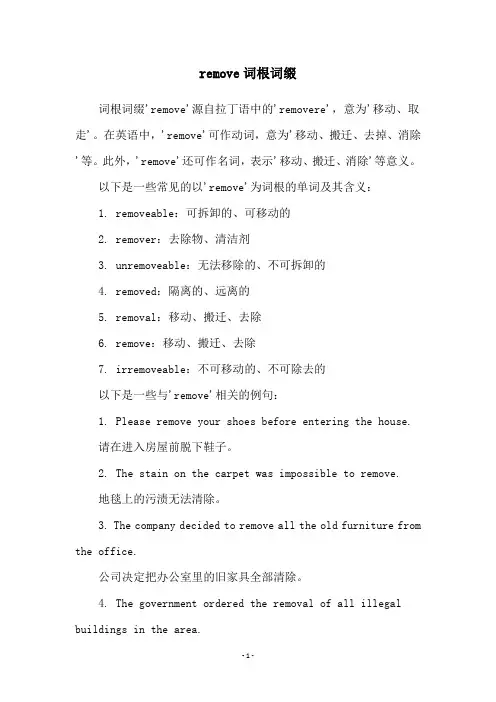
remove词根词缀词根词缀'remove'源自拉丁语中的'removere',意为'移动、取走'。
在英语中,'remove'可作动词,意为'移动、搬迁、去掉、消除'等。
此外,'remove'还可作名词,表示'移动、搬迁、消除'等意义。
以下是一些常见的以'remove'为词根的单词及其含义:1. removeable:可拆卸的、可移动的2. remover:去除物、清洁剂3. unremoveable:无法移除的、不可拆卸的4. removed:隔离的、远离的5. removal:移动、搬迁、去除6. remove:移动、搬迁、去除7. irremoveable:不可移动的、不可除去的以下是一些与'remove'相关的例句:1. Please remove your shoes before entering the house.请在进入房屋前脱下鞋子。
2. The stain on the carpet was impossible to remove.地毯上的污渍无法清除。
3. The company decided to remove all the old furniture from the office.公司决定把办公室里的旧家具全部清除。
4. The government ordered the removal of all illegal buildings in the area.政府下令拆除该地区所有非法建筑。
5. The package was safely removed from the delivery truck.包裹已经安全地从运货车上取下。
总之,'remove'是一个常见的词根词缀,广泛应用于日常生活和各个领域。

通知开篇用词:“通知要求”,要“深入开展”,“加强……建设”,“认真贯彻”,“牢固树立”,“充分发挥”,“大力宣传和弘扬”……文中用词:通知强调”,“要切实改进作风”,“严格执行”,“坚决落实”,“牢固树立”,“大力发扬”,“坚决制止”,“严禁控制”,“严禁收受”,“严禁利用”,“加大力度”……“通知要求”,“要认真解决”,“要深入……尤其要深入”,“着力解决”,“加强……监督检查”,“及时发放”,“妥善解决”,“采取有效措施”,“确保”,“严格执行”,“严肃查处”,“强化……管理”,“确保”,“切实落实”,“强化行政问责”,“加强”,“严厉打击”,“有效防范和坚决遏制”,“高度重视”,“及时地处理”,“积极防范和妥善处置”,“切实维护社会和谐稳定”。
公务文书常用词语A【案卷】就是党政机关、社会团体、企事业单位分类保存以备查考的文件。
【按期】、【按时】都是依照规定期限或时限的意思。
【按语】就是发文单位批转的或转发的公务文书所做的说明或提示。
B 【颁布】就是公布、多用于公布重要的法律、规定、条例、命令等。
【颁发】就是"发布"或"授予"的意思,多用于领导机关发布重要文件或向有关单位或人员授奖。
【报请】就是"用书面报告请示",多用于将某一事项向上级领导机关报告,并请求批复时。
【报经】就是上报并已经过的意思。
【备案】就是向主管机关报告事由存案以备查考。
【本】就是"自己"的意思,既可以用于机关、团体、单位和个人自称,也可以用于文件本身。
【比照】就是按照已有的同一类型的作法或同一范畴的制度对比处理。
【不日】就是"不久、不几天"的意思。
【不宜】就是不适宜。
【不予】就是不准或不给的意思。
C【参照】就是参考并仿照的意思。
【参酌】就是参考实际情况,加以斟酌。
【草拟】就是指文件的起草撰拟。
【查收】就是检查后收下。
【查照】就是提请对方注意文件内容或按照文件内容办事。
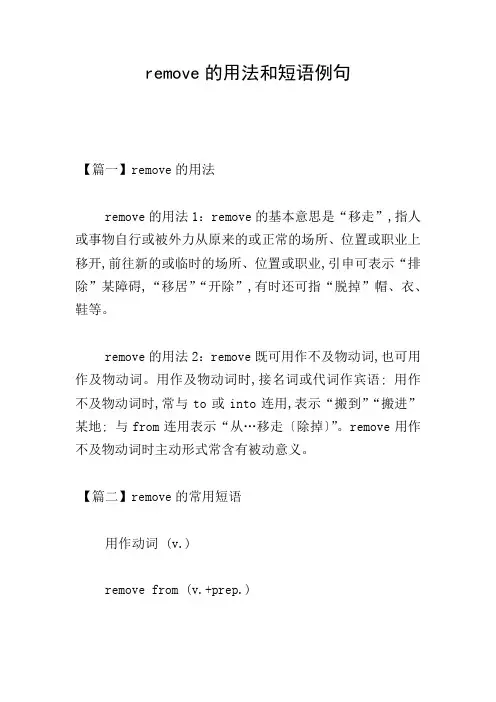
remove的用法和短语例句【篇一】remove的用法remove的用法1:remove的基本意思是“移走”,指人或事物自行或被外力从原来的或正常的场所、位置或职业上移开,前往新的或临时的场所、位置或职业,引申可表示“排除”某障碍,“移居”“开除”,有时还可指“脱掉”帽、衣、鞋等。
remove的用法2:remove既可用作不及物动词,也可用作及物动词。
用作及物动词时,接名词或代词作宾语; 用作不及物动词时,常与to或into连用,表示“搬到”“搬进”某地; 与from连用表示“从…移走〔除掉〕”。
remove用作不及物动词时主动形式常含有被动意义。
【篇二】remove的常用短语用作动词 (v.)remove from (v.+prep.)remove into (v.+prep.)remove out (v.+adv.)remove to (v.+prep.)【篇三】remove的用法例句1. Remove the meat with a fork and divide it among four plates.用餐叉把肉叉走,分到4个盘里。
2. Remove from the heat, add the parsley, toss and serve at once.端离炉子,加上欧芹,颠起翻面后就立刻上桌。
3. Vintage ports must be decanted to remove natural sediments.上等的波尔图葡萄酒必须倒入其他容器中以滤除自然沉淀物。
4. Remove the vegetables from the steamer when they are three-quarters cooked.将蔬菜蒸至大半熟后从蒸锅里捞出。
5. When the fruit is mushy and cooked, remove from the heat.当水果变软煮好后,就从火上端下来。
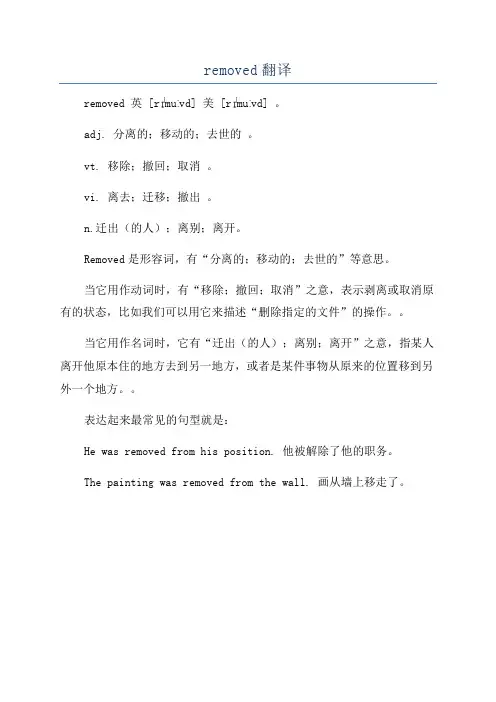
removed翻译
removed 英 [rɪˈmuːvd] 美 [rɪˈmuːvd] 。
adj. 分离的;移动的;去世的。
vt. 移除;撤回;取消。
vi. 离去;迁移;撤出。
n.迁出(的人);离别;离开。
Removed是形容词,有“分离的;移动的;去世的”等意思。
当它用作动词时,有“移除;撤回;取消”之意,表示剥离或取消原有的状态,比如我们可以用它来描述“删除指定的文件”的操作。
当它用作名词时,它有“迁出(的人);离别;离开”之意,指某人离开他原本住的地方去到另一地方,或者是某件事物从原来的位置移到另外一个地方。
表达起来最常见的句型就是:
He was removed from his position. 他被解除了他的职务。
The painting was removed from the wall. 画从墙上移走了。

remove的用法和搭配
1. “Remove”可以表示“拿走”,就像我跟小明说:“帮我把桌子上的书 remove 掉呀!”
2. 它能和“from”搭配,比如:“She removed the dirt from her shoes.”(她把鞋子上的脏东西去掉了。
)
3. 你还可以说“remove oneself”来表示“离开”呢,像“Larry removed himself from the room.”(拉里自己离开了房间。
)
4. “remove something to”也是一种用法哟,比如“Please remove these toys to the basket.”(请把这些玩具移到篮子里。
)
5. 当你想说“除掉”不良习惯时,也能用“remove”,例如:“He is trying to remove his bad habit of smoking.”(他正在努力改掉他抽烟的坏习惯。
)
6. 还有“remove doubt”表示“消除疑虑”,就像“His words removed my doubt.”(他的话消除了我的疑虑。
)
7. “remove obstacles”是“排除障碍”呀,比如“We need to remove the obstacles on the road.”(我们需要排除路上的障碍。
)
8. 最后,“remove”也可以形象地表示从心里“移除”某种情绪,像“She tried to remove her sadness.”(她试图移除她的悲伤。
)
总之,“remove”的用法和搭配还真不少呢,学会了就能让我们的表达更丰富啦!。

19世纪时海盗猖獗。
∙ 2.N-COUNT道德败坏者;违法者You can refer to someone who behaves in an immoral or illegal way as a pirate .Of course I knew Max was a rogue, a bit of a pirate.我当然知道麦克斯是个无赖,是个小流氓。
∙ 3.VERB非法复制及出售(录像带、录音带、书籍、计算机程序等)Someone who pirates video tapes, cassettes, books, or computer programs copies and sellsthem when they have no right to do so.A school technician pirated anything from video nasties to computer games.学校的一名技术人员做盗版,从黄色录像到计算机游戏什么都有。
...American manufacturers who've seen their designs pirated in other countries.见过自己的设计在其他国家遭到盗版的美国制造商∙piratedPirated copies of music tapes are flooding the market...盗版音乐带正充斥市场。
A pirated edition of the book was published in August 1986.这本书的一个盗版版本在1986年8月出版。
∙ 4.ADJ盗版的;盗用的;剽窃的A pirate version of something is an illegal copy of it.Pirate copies of the video are already said to be in Britain.该录像带的盗版版本据说已在英国出现。
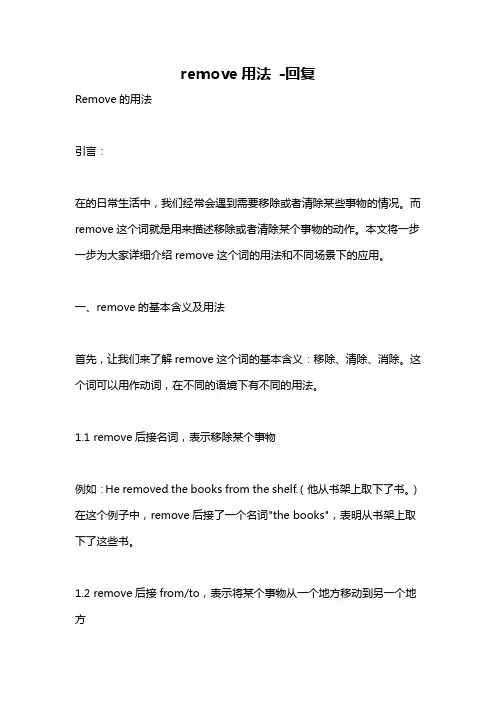
remove用法-回复Remove的用法引言:在的日常生活中,我们经常会遇到需要移除或者清除某些事物的情况。
而remove这个词就是用来描述移除或者清除某个事物的动作。
本文将一步一步为大家详细介绍remove这个词的用法和不同场景下的应用。
一、remove的基本含义及用法首先,让我们来了解remove这个词的基本含义:移除、清除、消除。
这个词可以用作动词,在不同的语境下有不同的用法。
1.1 remove后接名词,表示移除某个事物例如:He removed the books from the shelf.(他从书架上取下了书。
)在这个例子中,remove后接了一个名词"the books",表明从书架上取下了这些书。
1.2 remove后接from/to,表示将某个事物从一个地方移动到另一个地方例如:She removed the child from the dangerous situation.(她将孩子从危险的情况中救出。
)在这个例子中,remove后接了from和to两个介词,表示将孩子从危险的情况中救出。
1.3 remove后接物主代词,表示清除某人某事物的责任或者职务例如:The company removed him from the position.(公司将他免职。
)在这个例子中,remove后接了物主代词"him",表示公司免去了他的职务。
二、remove的相关搭配用法除了上面介绍的基本用法外,remove还可以和其他词搭配使用,形成一些常用短语或者固定搭配。
下面将为大家介绍其中几个常见的搭配用法。
2.1 remove from office(免职)例如:The president was removed from office due to corruption charges.(总统因为腐败指控而被免职。
)2.2 remove stains(清除污渍)例如:I used a special stain remover to remove the coffee stains from my shirt.(我使用了一种特殊的污渍清洁剂清除了衬衫上的咖啡渍。

英语代词用法大全代词It 的用法1.作人称代词John likes playing Pingpong./ He always does it in the afternoon.(指代上下文提到的事物);/ It's time we went home. / How far is it from here to your home ? / It is getting warmer and warmer./ It's very quiet at the moment.(可指时间、天气、环境等)2.引导词 A.作形式主语,代替由不定式、动名词或从句表示的真正主语。
It's important for us to learn a second language./ It's no use talking to him./ It's known to all that the earth goes round the sun. B.作形式宾语,代替由不定式、动名词或从句表示的真正宾语。
We feel it our duty to help others./ He made it clear that he would leave the city. C.强调结构:It is (was) +被强调部分+that (或who)… 注意: 在强调结构中,如被强调部分为时间状语或地点状语,其后的连接词也绝不能为when 或where,而应用that 。
在复习中,一定要注意句式的不同。
It was in Shanghai that I bought the guitar.(that引起强调句) It was Shanghai where I bought the guitar.(where引起定从) It was twelve o'clock when we arrived there.(when引起时间状语从句) It was at twelve o'clock that we arrived there.(that 引起强调句)3. it,one,that 的区别:作为代词,这三个词的对比使用是高考的热点之一。
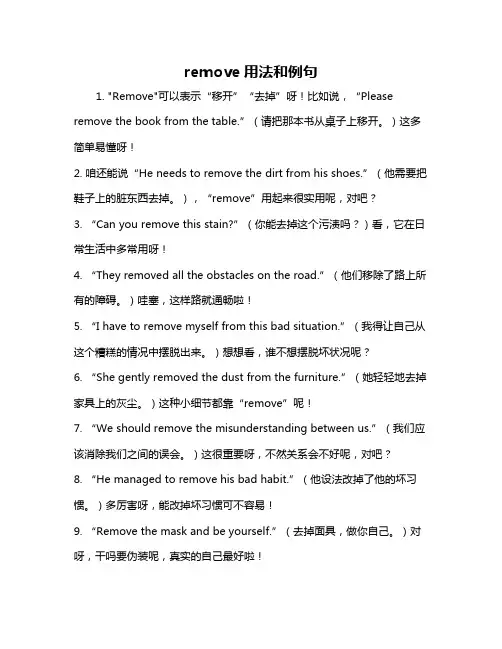
remove用法和例句1. "Remove"可以表示“移开”“去掉”呀!比如说,“Please remove the book from the table.”(请把那本书从桌子上移开。
)这多简单易懂呀!2. 咱还能说“He needs to remove the dirt from his shoes.”(他需要把鞋子上的脏东西去掉。
),“remove”用起来很实用呢,对吧?3. “Can you remove this stain?”(你能去掉这个污渍吗?)看,它在日常生活中多常用呀!4. “They removed all the obstacles on the road.”(他们移除了路上所有的障碍。
)哇塞,这样路就通畅啦!5. “I have to remove myself from this bad situation.”(我得让自己从这个糟糕的情况中摆脱出来。
)想想看,谁不想摆脱坏状况呢?6. “She gently removed the dust from the furniture.”(她轻轻地去掉家具上的灰尘。
)这种小细节都靠“remove”呢!7. “We should remove the misunderstanding between us.”(我们应该消除我们之间的误会。
)这很重要呀,不然关系会不好呢,对吧?8. “He managed to remove his bad habit.”(他设法改掉了他的坏习惯。
)多厉害呀,能改掉坏习惯可不容易!9. “Remove the mask and be yourself.”(去掉面具,做你自己。
)对呀,干吗要伪装呢,真实的自己最好啦!总之,“remove”的用法很多,在各种情境中都能派上用场,好好掌握它吧!。

remove的用法和搭配是什么
remove这个英语单词在句式中可以被用作动词或者名词,当remove表示及物动词时意思是移动,迁移,开除,调动,当remove 表示不及物动词时意思是移动,迁移,搬家,remove作为名词使用时,意思是移动,距离,搬家。
remove这个动词的常见搭配是remove from,意思是除掉,移动。
扩展资料
remove的时态用法
remove的过去式是removed,过去分词形式是removed,现在分词为removing,第三人称单数是removes。
remove同根词拓展
词根:remove
形容词:
removed 远离的,隔了...代的
removable 可移动的.,可去掉的,可免职的
名词:
removal 免职,移动,排除,搬迁
remover 去除剂,搬运工,搬家公司。
【导语】remove有消除;脱掉;免除;搬迁等意思,那么你知道remove的⽤法吗?下⾯跟着⼀起来学习⼀下,希望对⼤家的学习有所帮助!【篇⼀】remove的⽤法 remove的⽤法1:remove的基本意思是“移⾛”,指⼈或事物⾃⾏或被外⼒从原来的或正常的场所、位置或职业上移开,前往新的或临时的场所、位置或职业,引申可表⽰“排除”某障碍,“移居”“开除”,有时还可指“脱掉”帽、⾐、鞋等。
remove的⽤法2:remove既可⽤作不及物动词,也可⽤作及物动词。
⽤作及物动词时,接名词或代词作宾语; ⽤作不及物动词时,常与to或into连⽤,表⽰“搬到”“搬进”某地; 与from连⽤表⽰“从…移⾛〔除掉〕”。
remove⽤作不及物动词时主动形式常含有被动意义。
【篇⼆】remove的常⽤短语 ⽤作动词 (v.) remove from (v.+prep.) remove into (v.+prep.) remove out (v.+adv.) remove to (v.+prep.)【篇三】remove的⽤法例句 1. Remove the meat with a fork and divide it among four plates. ⽤餐叉把⾁叉⾛,分到4个盘⾥。
2. Remove from the heat, add the parsley, toss and serve at once. 端离炉⼦,加上欧芹,颠起翻⾯后就⽴刻上桌。
3. Vintage ports must be decanted to remove natural sediments. 上等的波尔图葡萄酒必须倒⼊其他容器中以滤除⾃然沉淀物。
4. Remove the vegetables from the steamer when they are three-quarters cooked. 将蔬菜蒸⾄⼤半熟后从蒸锅⾥捞出。
remove的用法remove是一个常见的英语单词,它表示“移除、去除、删除”的意思。
在日常生活中,我们经常需要使用remove这个词来描述我们所要做的事情。
下面是remove的常见用法。
1. remove + 物体/物品例如:- Please remove your shoes before entering the house.(请在进屋前脱掉鞋子。
)- I need to remove this stain from my shirt.(我需要把衬衫上的污渍去掉。
)- The doctor will remove the cast from my arm next week.(医生下周会把我的手臂石膏取下来。
)2. remove + 人/动物例如:- The police removed the protesters from the street.(警察把抗议者从街上驱散了。
)- The zookeeper removed the baby elephant from its mother for medical treatment.(动物园管理员把小象从母象身边带走进行医疗治疗。
)3. remove + 不可数名词例如:- The water company had to remove the chlorine from thedrinking water.(水公司必须将饮用水中的氯去除。
)- The chef removed the excess oil from the dish.(厨师将菜肴中的多余油分去掉。
)4. remove + from + 地点/位置例如:- The statue was removed from the public square.(雕像被从公共广场上拆除了。
)- I removed the books from the shelf and put them in a box.(我把书从书架上取下来放到了一个箱子里。
单数复数人称主格宾格主格宾格第一人称I me we us 第二人称youyouyouyouhe himshe her 第三人称it itthey them 人称代词主格:作主语,表示谁怎么样了、干什么了。
I am a teacher. You are student.He is a student, too. We/You/They are students.人称代词宾格作宾语,表示动作行为的对象。
Give it to me. Let’s go (let’s =let us)单数复数人称类第一第二第三人称第一第二第三人称代词练习一、选出括号中正确的词,在正确的词下画线。
1. This is (my / I )mother.2. Nice to meet (your / you ).3. (He / His )name is Mark.别人称人称人称人称a.my yourhis her its our you rtheirn.min e yours his her s its our s you rstheirs汉语我的你的他的她的它的我们的你们的他(她、它)们的形容词性物主代词(my/your/his/her/its/our/their)+名词而名词性物主代词(mine/yours/his/hers/its/ours/theirs 则相单于形容词性物主代词+名词,故其后不必加名词。
如:Is this your book? No,,it isn ’t , it ’s hers(her book)It’s Alice’s.(Jim ’s , Tom ’s , Maria ’s )4. What’s(she / her)name?5. Excuse(me / my / I).6. Are(your / you)Miss Li?7.(I/ My)am Ben. 8.(She / Her)is mysister.9. Fine , thank (your / you). 10. How old is (he /his)二、用所给代词的正确形式填空。
little 则表示数量虽然少但毕竟还有,强调“有”,含有肯定意义。
如:He knew few of them. He sold only a few of the papers. 他只卖出了几份报纸。
He knew little about it. There is still a little left.4. all, every, each的用法。
从强调重点上看:all强调整体,every 强调总体中的所有成员(与all很接近),each则强调逐个逐个地;从用法上看:all和each既可单独使用,也可后接名词,还可后接of短语;而every 后必须接名词,既不能单独使用也不能后接of 短语;从含义上看,each 指两者或两者以上的“每个”,every指三者或三者以上“每个”,因此指两者时只能用each。
如:All was destroyed in the big fire.Each of us has a book.All are present.= Everyone is present..注意:1)在表示“每个”、“全体”意思时,every的意思与all很接近。
但一般情况下every和单数名词搭配,all和复数名词搭配。
例:Every child enjoys Christmas.All children enjoy Christmas.2)each也是“每一个”的意思,但与every不同,each用于指两个或两个以上的人或物,着重于个别概念。
例:Two men came into the room.Each carried an umbrella.Each/Every book on this desk is worth reading.5. other, the other, another, others的用法。
指单数时,若泛指用another,若特指用the other;指复数时,若泛指用other(后接复数名词)或others(其后不接名词),若特指用the other (后接复数名词)或the others(其后不接名词)。
如:Show me some others. Show me another.We should think of others. Where are the other students?注:another后一般要单数可数名词,若其后的名词有数词或few 修饰,则也可接复数名词。
如:I've got another five minutes. 我还有5分钟。
6. no one, nobody, none 的用法。
no one 与nobody 用法相似,均只用于指人不用于指物,且其后不能接of短语,用作主语时谓语用单数;而none 既可用于指人也可用于指物,其后通常接of短语,用作主语时,若指不可数名词,谓语只能用单数,若指复数名词,则谓语可用单数(较正式)也可用复数(用于非正式文体)。
如:No one [Nobody] has read it. None of this milk can be used.None of the films is [are] worth seeing.7. 复合不定代词的用法。
复合不定代词主要包括something, somebody, someone, anything, anybody, anyone, nothing, nobody, no one, everything, everybody, everyone 等,它们在句中可用作主语、宾语或表语,但不能用作定语。
其中something, someone 等和anything, anyone 等的区别与some 和any 的区别一样,前者一般用于肯定句,后者一般用于否定句、疑问句或条件句。
使用时应请注意以下几点:(1) 受定语修饰时,定语应置于其后。
如:Tell us something interesting. There was nobody tired.(2) 指人的复合不定代词若用作主语,其谓语动词一般用单数,相应的人称代词和物主代词也用单数he, him, his (不一定指男性)。
但在非正式文体中常用复数代词they, them, their。
如:If anybody [anyone] comes, ask him [them] to wait. 要是有人来,让他等着。
(3) anyone, everyone 等只能指人,不能指物,且其后一般不接of 短语。
若是指物或后接of 短语,可用any one, every one (即分开写)。
8.one, that和itone表示泛指,that和it 表示特指。
that与所指名词为同类,但不是同一个,而it 与所指名词为同一个。
one泛指任何人,可以在形容词和that,this等词后代替刚提过的可数名词,其所有格形式为one’s,反身代词为oneself,复数形式为ones。
1)泛指“人”,如:One should be strict with oneself.人应该严格要求自己。
2)表示“一个人或物”,如:Chinese is one of the most useful languages in the world.汉语是世界上最有用的语言之一。
3)代替上文己出现过的可数名词,如I’ve lost my pen. I want to buy a new one.我的钢笔丢了,我想买一枝新的。
4)the one和the ones表示特定的人或物,如:No film is as good as the one I saw last week.我上周看的电影最好。
Students who do well in examinations are the ones who ask questions in class.考试成绩好的都是上课爱提问的学生。
5)One前可以有形容词修饰,这时它需带冠词或受形容词性的物主代词修饰,如:I have two balls. The old one is on the floor. The new one is in my hand.我有两个球,旧的在地板上,新的在我手里。
He bought a new pen yesterday. His old one is broken.昨天他买了一支新钢笔,他那支旧的坏了。
6)one可用this,that,any,some,each,the,next,every,which等修饰,如:Here are two umbrellas,which one is yours?This one or that one?这儿有两把伞,哪一个是你的?这个还是那个?7)one或ones带后置定语时,前面要加定冠词,如:Is this the one you want?这是你想要的那个吗?8)one和it的区别,如:one和ones是泛指,表示同类中的任何一个或几个,it是特指,指代上文出现过的某一物。
如:This book is a good one. May I borrow it?这是一本好书,我可以借它吗?比较I can't find my hat. I think I must buy one.(不定)我找不到我的帽子了。
我想我该去买一顶。
The hat you bought is bigger than that I bought.(同类但不同个)你买的那顶帽子比我买的大。
I can't find my hat. I don' t know where I put it.( 同一物)(5)much和many的用法much和many都有“许多”的意思,much表示或修饰不可数名词,many 表示或修饰可数名词。
1)much或many多用于疑问句或否定句,在肯定句中常用a lot of,lots of,plenty of,a large quantity of,quantities of 代替,much还可用a great deal of 代替,many还可用a(large)number of代替。
2)much和many在句中可作主语、宾语或定语,many作主语时,谓语动词用复数,much作主语时,谓语动词用单数,如:Many of the students did well this time.这次许多学生做得好。
(作主语)Much of the time is free. 许多时间是空闲的。
(作主语)I have much to say.我有许多话要说。
(作宾语)I don’t have much to do today.今天我没太多的事要做。
(做宾语)Many people wanted to stay here.许多人想呆在这儿。
(作定语)There’s much water in the bottle.瓶里有许多水。
(作定语)3)much可用作副词、作状语,表程度,如:The city is much larger than that one.这个城市比那个城市大多了。
4)be not much意为“不怎么样”,如:I’ve visited the country and it is not much.我拜访过那个国家,并不怎么样。
5)much还可与too连用,构成“too much+不可数名词”短语,意为“太多的……”如:There is too much noise in the classroom. 在教室里有太多嘈杂声。
6)much还可与too连用,构成much too“非常”副词词组,修饰形容词、副词,不修饰动词,如:I’m much too busy to see visitors.我太忙,不能会见来访者。
7)“many a+可数名词单数”表示“许多”,如:Many a way has been tried.己试过不止一个方法了。
8)在名词前如果有冠词或指示代词等词时,要用many of或much of结构,如:Many of my books are English.我的书大多是英语书。
(6)either和neither的用法Either指“两个人或物中的任何一个”,表示肯定意义,neither指“两个人或物中一个也不,两者都不”表示否定意义。
1)这两个词在句中可作主语、宾语、定语,作主语时谓语动词用单数,如:Either of them has a pen. 他们两人都有一枝钢笔。